Introduction to the CESE Method
We have published an update on the CESE Method, here. The CESE Method is a method for showing schools how to improve, as opposed to the current New Mexico Public Education Department system, that only shows schools how well they are doing compared to standards.
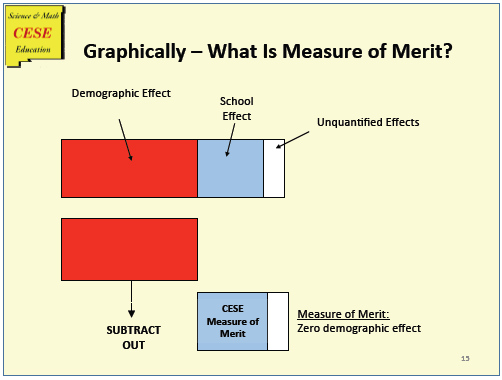
The November Beacon is On Line!
The November 2012 Beacon (Vol XVI, No 3) is online!
Contents Preview: President’s Message from Ken Whiton. Message from Editor Kim Johnson - "Here They Come Again!" Plus "Clarification on the Urey-Miller Experiment (initial creation of organic molecules on Earth) that creationists never get right" by Dr. Paul Braterman.
You can browse previous issues of the Beacon here.
CESE Welcomes New Board Member
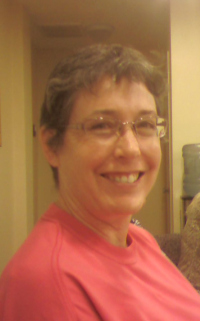 CESE is pleased to welcome our newest Board Member at Large, Patty Finley.
CESE is pleased to welcome our newest Board Member at Large, Patty Finley.
Patty is a chemical engineer who taught high school science for many years and middle school science for one year. Patty's interests include statistical analysis, which she worked on in quality control years ago.
Welcome aboard, Patty!
The full board is listed here.
And Now, the Los Alamos Monitor…
... has joined the growing list of media outlets giving a nod to CESE's research on New Mexico's proposed A-F Grading System.
The guest viewpoint by Sherry Robinson appeared in the Monitor on August 4th, and is reproduced here for the benefit of CESE readers. It does not appear to have been posted on the Monitor's website, but we will add a link to the article if it is posted in future.
Here are few teasers to whet your appetites for the article!
Now we're starting to hear from parties that don't have a political agenda, and it's official: The state's grading system of schools is too complicated, and the methodology is questionable.
The nonpartisan Coalition for Excellence in Science and Math Education says the state's A-F school grading system is hard to understand, and the system combines elements that are not only apples and oranges but tofu and cheeseburgers. As a result, the results can swing dramatically from year to year.
The coalition's only agenda is to improve math and science education in the state: its membership is weighted with scientists and engineers, many with national lab backgrounds. I've always found them reliable.
Thank you, Sherry Robinson!
Also new this week: Minutes of the 2012 Annual Meeting, featuring outgoing president Terry Dunbar and incoming president Ken Whiton's remarks, as well as a riveting presentation by former State Senator Pauline Eisenstadt on her tumultuous career at the New Mexico roundhouse.
Journal Editorial: “Simplify A-F Grading Formula To Get Buy-In”
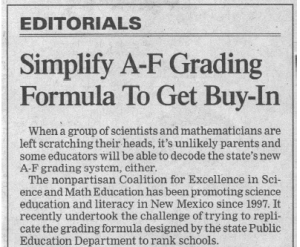 The Albuquerque Journal published an editorial on August 4th, titled "Simplify A-F Grading Formula To Get Buy-In." CESE is mentioned prominently!
The Albuquerque Journal published an editorial on August 4th, titled "Simplify A-F Grading Formula To Get Buy-In." CESE is mentioned prominently!
When a group of scientists and mathematicians are left scratching their heads, it’s unlikely parents and some educators will be able to decode the state’s new A-F grading system, either.
The nonpartisan Coalition for Excellence in Science and Math Education has been promoting science education and literacy in New Mexico since 1997. It recently undertook the challenge of trying to replicate the grading formula designed by the state Public Education Department to rank schools.
It couldn’t, partly because it didn’t have all of the data the PED used, but the group concluded the formula is too complex, adds together incompatible elements and is so sensitive to small changes that unreasonable grade swings from one year to the next can result.
“We’re not talking about a bunch of schmucks here who haven’t seen this stuff before,” said M. Kim Johnson, a retired physicist and an author of the report. “We think it’s all probably above board, but we don’t think the average person, school principal or superintendent could conceivably follow it.”
Please, click through and read the entire editorial.
Thank you, Albuquerque Journal!
CESE in the News, II: Albuquerque Journal, July 31, 2012
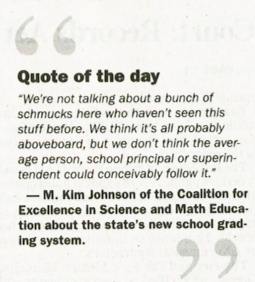 A major article by Hailey Heinz appeared in the Albuquerque Journal on Tuesday, July 31st, on page C-1 (Metro & NM), with the title " Group: Grading System Too Complex." Also, a sound bite by our own Kim Johnson was selected by the Journal as Tuesday's "Quote of the Day."
A major article by Hailey Heinz appeared in the Albuquerque Journal on Tuesday, July 31st, on page C-1 (Metro & NM), with the title " Group: Grading System Too Complex." Also, a sound bite by our own Kim Johnson was selected by the Journal as Tuesday's "Quote of the Day."
The copyrighted article goes into detail on CESE's findings regarding the A-F grading system, and on its interactions with the state legislature.
The Heinz article notes that
A nonpartisan group of scientists and mathematicians says the state’s new A-F school grading system is too complex for most people to understand, including principals and superintendents.
The group also believes the system adds elements together that aren’t compatible, and that the formula’s sensitivity to small changes results in unreasonable grade changes from one year to the next.
In addition, Heinz writes:
M. Kim Johnson, past president and an author of the report, said Rep. Rick Miera, D-Albuquerque, asked the group to examine the A-F school grading system and try to replicate it. Johnson said the group has testified before the Legislative Education Study Committee in the past and did so recently to present its findings.
...
Those findings were cited by Democrats in the Legislature, who sent out a news release last week expressing “deep concern” over the credibility of the A-F grades. Those quoted in the news release included Sen. Linda Lopez, D-Albuquerque; Sen. Howie Morales, D-Silver City; and Miera.
and continues:
The coalition contends it is mathematically inappropriate to add these [different] measures [of growth and current standing] together. According to the report, such addition is “something like adding oranges and cows to derive pickup trucks. The result is not obviously meaningful.”
... Doing so also is part of the reason for dramatic changes in grades.
Those changes have come under scrutiny, as some school grades went from “B” to “F,” and vice versa, between preliminary January grades and final July grades.
The full article in appears in the Wednesday Journal.
Message from CESE 2012-2013 president Ken Whiton
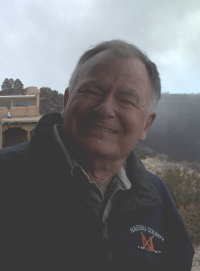
Cheers to the board and our membership for a great annual meeting.
- Thanks to Terry for a great year as president.
- Thanks to Matt for serving as our Vice President.
- Thanks to Jerry for serving so long and so effectively as our treasurer.
- Thanks to Marilyn for her expertise and dedication as our secretary.
- Thanks to our At Large Board Members: Rebecca, Marshall, Steve, Cindy, Lisa, Jack, Jesse, Kim, Marvin and Dave.
- Thanks to Pauline Eisenstadt for her insider's explanation of the inner workings of that often beneficial, often malevolent organism we know as our state legislature. It's a sad commentary on our history that being the first woman to serve in both houses of the legislature is a noteworthy achievement, but I know we're glad it was Pauline. Thanks to Pauline for all the good work she did to make New Mexico a better place to live and especially for taking the lead in the Evolution Wars. I read part of the Evolution Chapter relating the history of the battle for Science in our public schools and recommend to book to everyone.
- Thanks to all who made the meeting a success:
- Thanks to Kim who arranged for Pauline to be our speaker,
- Thanks to "The Amazing Dave" who held our rapt attention with a magic trick so stunning he didn't need a shapely female assistant. Dave also obtained our new domain name cese.org and arranged for the room, with the help of sponsor Les McFadden of UNM Geology Department.
- Jerry and Nancy, who signed people in at the door,
- Cindy who managed the book sales,
- Marilyn, who provided doughnuts and sent e-mail notices about the meeting,
- Thanks to those who had the foresight to create and sustain this organization.
- Thanks to all our loyal and supportive members. Nothing would happen without you.
- Thanks to you for entrusting me to lead CESE as your president. I know I can count on you all for guidance and support.
CESE Goals 2012/2013
- Continue the Murfin work. This is our most important contribution to teaching and learning in New Mexico. No one else is setting aside hunches, solutions that feel good, or solutions based on anecdotal information, in favor of cold-blooded research, statistical analysis and fearless presentation of the facts. At this moment, "Think New Mexico" is pushing their "Smaller Schools Initiative," claiming they have research showing, "smaller schools have better graduation rates and stronger school achievement, particularly for the most vulnerable students." Walt Murfin's method proves otherwise. Meanwhile The Santa Fe School District is already moving in that direction. No other organization is able to separate those factors which affect student performance but are outside the control of school staff, from areas that are. No other organization can tell when a school is outperforming or underperforming what is expected of it based on demographics. This is not to make excuses for poor performance. It is to show the role society plays in student achievement and the limitations of our schools. Others, including PED, have made attempts but the Murfin analysis has proven they fall short.
- Expand the audience for the Murfin work. Presentations have been given in several forums. Who else needs to hear what has been developed? How can they be reached with limited funds and time?
- Clarify CESE’s roll in educational improvement as strictly non-partisan and neither pro-union nor anti-union. Both political parties are wrong in their approach to student achievement. Solutions based on political ideology have failed.
- Continue supporting public policies that result in better Science teaching and encourage members to take part in the political process. Rather than only reacting to anti-Science proposals, CESE will advocate for legitimate, peer-reviewed Science. Creationists will have to explain why they want to redefine Science to fit their theology. Instead of just opposing bad legislation, we can also support good legislation.
- Recruit new members. CESE is unique among organizations working to improve teaching and learning. CESE invites and welcomes teachers into their ranks and respects the complexities of teaching. CESE actually listens to teachers. One group missing from our membership is principals, assistant principals and other school leaders. It’s easy for teachers to demean administrators (I’m good at that), but, it’s important to recruit them, include them, respect the complexities of administration and learn from them.
Ken
 One of the questions that is most asked of CESE when we present the CESE method is how the CESE Method results compare to the New Mexico Public Education Department (PED) grades. Here is a
One of the questions that is most asked of CESE when we present the CESE method is how the CESE Method results compare to the New Mexico Public Education Department (PED) grades. Here is a 
